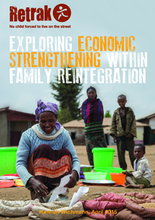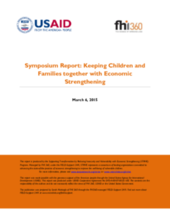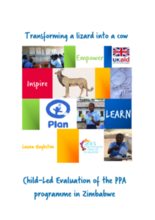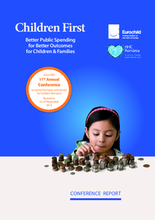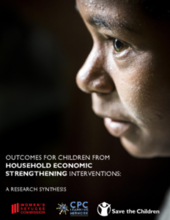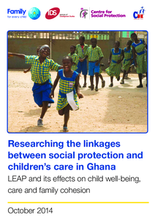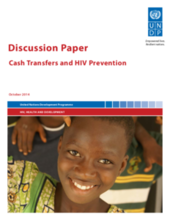Displaying 121 - 130 of 271
This document, developed through a mapping exercise conducted by the National Council for Children’s Services (NCCS) and the Department of Children Services (DCS) of Kenya, provides a comprehensive list of the agencies and programs in Kenya that provide services for children.
This small research project was conceived to investigate the issues surrounding economic strengthening with Retrak Ethiopia’s reintegration programmes with the aim of seeking new ways to address the challenges.
This symposium, sponsored by the CPC Network, Women’s Refugee Commission, and FHI 360, brought together leading global practitioners, researchers, policy experts and donors to explore the current best practices and evidence on the use of economic strengthening interventions to prevent child separation from, and support child reintegration back into, families and communities.
In 2011 Plan International UK secured a Programme Partnership Agreement (PPA) with the Department for International Development (DFID). This strategic funding has been used to develop the Building Skills for Life Programme.
This report summarizes the discussions and activities held at Eurochild’s 11th Annual Conference, co-hosted by Hope and Homes for Children in Bucharest, Romania on 26-28 November 2014.
This review focuses on the findings from high-quality published evaluation research into economic strengthening (ES) programs, implemented by NGOs, in resource-poor environments in the developing world, where external evaluators measured impacts on any of a wide variety of indicators of children’s or youth’s protection and wellbeing.
Through a desk review of peer reviewed journal and “grey” literature published in English and Russian languages, this paper provides a review of current deinstitutionalization efforts in the region, identifies potential challenges, describes the need for economic empowerment interventions, and outlines directions for future research.
This report was written by Keetie Roelen and Helen Karki Chettri from the Centre for Social Protection (CSP) at the Institute of Development Studies (IDS), with inputs and support from Family for Every Child and Challenging Heights, Ghana. The report investigates the links between child wellbeing, children’s care, family cohesion and the Livelihood Empowerment Against Poverty Programme (LEAP), a national social protection scheme in Ghana which aims to reduce extreme poverty in the country and is centred on providing cash transfers to the most vulnerable.
This paper from the United Nations Development Programme (UNDP) offers some recommendations on optimizing cash transfers in order to have the greatest impact on those affected by HIV/AIDS.

